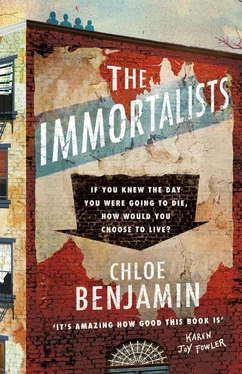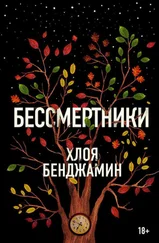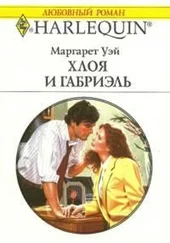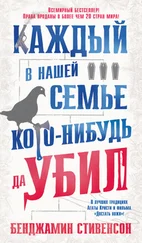‘You trust him with that?’ Simon asked last week, when Klara explained the procedure. ‘Do you want me to do it?’
‘I don’t mix business with pleasure.’
‘I’m pleasure?’
‘Well, no,’ she said. ‘You’re family.’
Now he watches her rise to the second-story windows. During a brief intermission, she changed into a sleeveless dress, nude-colored and covered with gold sequins; its fringed skirt hits mid-thigh. Klara drifts in ghostly circles before pulling her arms and legs close to her body. Suddenly, she’s a blur: red and gold, hair and glitter, a vortex of light. As she slows, she becomes his sister again – sweat gleams at her hairline, and her jaw is beginning to shake. Her feet stretch toward the stage, knees buckling once she’s low enough to reach it. She spits the bit into her palm and bows.
There is the clink of ice, the screech of chairs being adjusted, before the applause begins to surge. It isn’t magic, what Klara has done. There’s no trick – just a curious combination of strength and strange, inhuman lightness. Simon can’t tell whether it reminds him of a levitation or a hanging.
While the next act sets up, Simon finds Klara in the greenroom. He waits outside as she talks to the manager, a broad man in a tracksuit who looks to be in his fifties. When he shakes her hand and wraps his other one around her back, resting it on the curve of her bottom, Klara becomes rigid. After he leaves, she glances at the door before walking to the chair on which the manager left his leather jacket. A wallet bulges from one pocket. She takes a wad of bills and stuffs them down the side of her dress.
‘Seriously?’ asks Simon, stepping inside.
Klara whirls. The shame in her face turns to righteousness. ‘He was an asshole. And they paid me like shit.’
‘So?’
‘So what?’ She pulls on her tuxedo coat. ‘He had hundreds. I took fifty.’
‘How noble of you.’
‘Really, Simon?’ Klara is stiff-backed, packing supplies into Ilya’s black box. ‘I do my first show, the show I’ve been working on for years, and this is all you have to say to me? You want to talk about being noble?’
‘What’s that supposed to mean?’
‘It means word gets around.’ Klara closes the box and holds it between her arms like a shield. ‘My coworker is Adrian’s cousin. Last week, she said, “I think my cousin’s dating your brother.” ’
Simon blanches. ‘Well, that’s bullshit.’
‘Don’t lie to me.’ Klara leans toward him, her hair brushing his chest. ‘Robert is the best fucking thing that ever happened to you. You want to throw it away, that’s your choice, but at least have the decency to break up with him.’
‘Don’t tell me what to do,’ says Simon, but the worst part is that Klara doesn’t know half of it. Cruising Golden Gate Park in the early hours of the morning, fucking strangers in Speedway Meadows or the public restrooms at Forty-First and JFK. Hand jobs in the back row of the Castro Theatre while Little Orphan Annie sings onscreen. Hordes of men at the Wasteland at Ocean Beach, warming one another.
And the worst night: May, the Tenderloin. A drag queen in a spangled silver dress and chunky heels leads him to a single-occupancy hotel on Hyde. Someone’s pimp grabs Simon by the collar and searches for his wallet, but Simon knees him in the crotch and stumbles upstairs. They take a room and flick on a bedside lamp, and it is then that Simon sees his partner is Lady. She hasn’t been at Purp in weeks; they all assumed the worst, that the gay cancer got her, and for seconds, Simon feels a gust of relief. But Lady doesn’t recognize him. She takes a miniature vodka bottle out of her dress pocket. It’s empty, with an aluminum foil screen. She stuffs a rock into the chamber and inhales.
On the first day of June, Simon stands in the shower. Last night’s Myth performance was the first time that Simon touched Robert in days, the first time they stood together without arguing. Now, Simon tries to masturbate, thinking of Robert, but he can’t come until he remembers Lady crouched over her homemade pipe.
He picks up the shampoo bottle and throws it at the shower caddy with all his strength. The caddy jolts upward to smack the showerhead, which jumps out of its setting and swings wildly, wetting the ceiling, until Simon is able to turn the goddamned thing off. He slides down to sit against the tub’s cool porcelain and sobs. The dark mark still leers from his abdomen, though when he leans in, it looks more like a mole than it did the day before. Yes: it could definitely be a mole. He stands and adjusts the shower caddy, then steps onto the bath mat. Sunlight glazes the bathroom. Simon doesn’t notice that Robert is standing in the doorway until he speaks.
‘What is that?’ He stares at Simon’s stomach.
Simon grabs a towel. ‘Nothing.’
‘Like hell it’s nothing.’ Robert puts one hand on Simon’s shoulder and pulls the towel off. ‘Oh my God.’
They stare at it together for seconds. Then Simon hangs his head.
‘Rob,’ he whispers. ‘I’m so sorry. I’m so sorry for what I’ve done to us.’ Then, madly: ‘There’s a show tonight. We have to get to the theater.’
‘No, baby,’ says Robert. ‘That’s not where we need to go,’ and in minutes, he’s called them a cab.
9.
There are twelve beds in Simon’s ward at San Francisco General. The swinging door that leads inside has a laminated sign – MASK GOWN GLOVES PUNCTURE PROOF NEEDLE BOX IN ROOM NO PREGNANT WOMEN – and a smaller sign that reads No Flowers .
Klara and Robert stay overnight in Simon’s room, sleeping in chairs. His bed is separated from another by a thin white curtain. Simon doesn’t like to look at his roommate, a former chef whose bones now protrude; he can’t keep anything down. Within days, the bed is empty again, the partition drifting in the breeze.
Robert says, ‘You have to tell your family.’
Simon shakes his head. ‘They can’t know I went like this.’
‘But you haven’t gone,’ says Klara. Her lap is covered with pamphlets – When a Friend Has Cancer; Affection, Not Rejection – and her eyes are slick. ‘You’re right here, with us.’
‘Yeah.’ Simon’s throat feels tight: the glands in his neck are swollen. One night, when Robert and Klara leave to get takeout, Simon scoots to the edge of the bed and reaches for the phone. He’s ashamed to realize he doesn’t even have Daniel’s number, but Klara left a pile of belongings on her chair, including a slender red address book. Daniel picks up on the fifth ring.
‘Dan,’ says Simon. His voice is raspy and his left foot twitches, but he floods with gratitude.
There is a long pause before Daniel speaks. ‘Who is this?’
‘It’s me, Daniel.’ He clears his throat. ‘It’s Simon.’
‘Simon.’
Another pause, which stretches so long Simon knows it won’t end unless he fills it.
‘I’m sick,’ he says.
‘You’re sick.’ A beat. ‘I’m sorry to hear that.’
Daniel speaks stiffly, as if to a stranger. How long has it been since they’ve talked? Simon tries to imagine how Daniel’s face might look. He’s twenty-four years old.
‘What are you doing?’ Simon asks – anything to keep his brother on the phone.
‘I’m in medical school. I just got home from class.’
Simon pictures it: doors whooshing open and shut, young people walking with backpacks. The thought comforts him so deeply that he feels almost able to fall asleep. With his nerve pain and his twitching, he spends most nights awake.
‘Simon?’ Daniel asks, softening. ‘Is there anything I can do?’
‘No,’ Simon says, ‘there’s nothing.’ He wonders if Daniel is relieved when he hangs up.
Читать дальше








![Мелани Бенджамин - Госпожа отеля «Ритц» [litres]](/books/384861/melani-bendzhamin-gospozha-otelya-ritc-litres-thumb.webp)



